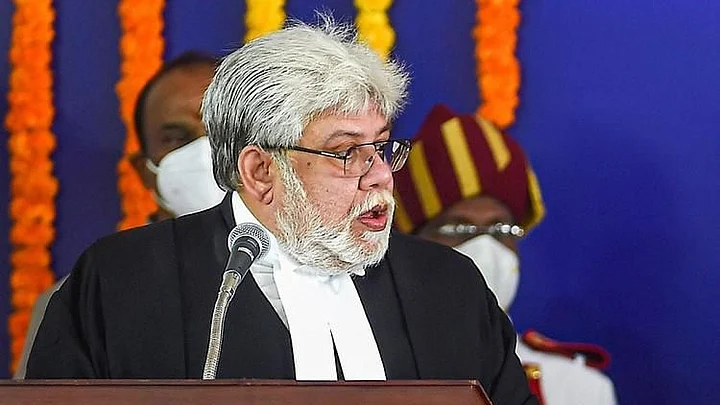The Madras Bar Association on Sunday, 14 November, convened an emergency general body meeting and passed a resolution by majority vote requesting the collegium to reconsider the transfer of Madras High Court Chief Justice Sanjib Banerjee and Justice TS Sivagnanam.
The Collegium had recommended the transfer of CJ Sanjib Banerjee to the Meghalaya High Court, and Justice Sivagnanam to the Calcutta High Court.
Both transfers are seen as punitive measures; CJ Sanjib Banerjee’s because the Meghalaya High Court is a smaller court than the Madras one; Justice Sivagnanam’s, because proper procedures were not followed before he was suggested for transfer. Justice TS Sivagnanam was sworn in as a judge of the Calcutta High Court on 25 October.
Bar Association Deeply Concerned With Opaqueness Surrounding the Transfers
In its resolution, the bar association said it was deeply concerned with the opaqueness surrounding the transfers.
“The transfers are perceived to be in violation of Memorandum of Procedure (MOP) for transfer. Such transfers are perceived to be punitive and do not augur well for the independence of the judiciary,” the association said.
The bar association also requested that the Union government, which implements transfers, to decline the collegium’s recommendation to transfer the Chief Justice.
The transfers of the two judges are seen as politically motivated by some critics, as both Justice Banerjee and Justice Sivagnanam have presided over crucial human rights and environment protection cases, and have given orders that are perceived as adversarial to the government, its agencies and interests.
Justice Sanjib Banerjee, for instance, has taken several government agencies to task, including the Election Commission which, he said, should be booked for murder for failing to ensure COVID-19 norms were followed during rallies, and called the agency singularly responsible for the second wave.
He also pulled up the Greater Chennai Corporation for its efforts to prevent inundation in the city during the recent rains. Justice Sivagnanam meanwhile presided over matters such as the Sterlite issue as well as the Salem 8-lane highway project.
'Before Suggesting a Transfer, the Collegium Is Supposed to Consult With the Judge'
Speaking to TNM, senior advocate V Prakash who moved the resolution on Sunday said that the Collegium system was put in place to protect the independence of the judiciary, and said that if there was reason to transfer the judge, the public must know.
He said that if there was an initiative to transfer a judge, the proposal comes from the Chief Justice of India.
“For the Chief Justice of India to initiate the proposal, should he not have some material? If he has the material, are the public not entitled to know what the material is?” he questioned, especially since it is a person holding a public office and is crucial to administering justice.
He added that before suggesting a transfer, apart from consulting members of the Collegium as well as those who have worked with the judge, the Collegium is also supposed to consult the judge or the chief justice about what their personal circumstances are. The bar association believes these procedures were not followed in Justices Sanjib Banerjee and Sivagnanam’s cases, Prakash said.
The advocate also raised a red flag about the timing when the resolutions regarding the transfer of jugdes were uploaded. He said that while CJ Sanjib Banerjee’s transfer was recommended on 16 September, it was only uploaded recently, while nearly all others were uploaded on 17 September. “Why were these resolutions withheld? There is an element of suspicion about the manner in which this was done,” he said.
'Unless Bar Associations Are Entitled to Question This, There Will No Judicial Accountability'
The advocate said he spoke to the members of the bar about the pattern that the Supreme Court says that neither the associations nor the public has a locus standi to question their decision. The concerned judge can sue, but often doesn't because it’s likely it will go before the same judges, some of whom may be members of the collegium, he says.
“When I spoke, I pointed out that though they say there will be a judicial review of the decision making in the instance of the judge if he is aggrieved, in reality, that judicial review is not happening. Unless the Bar Associations are entitled to question this, there will not be any judicial accountability — and that should be placed before persons who are not members of the Collegium. Then, there will be some judicial accountability of an executive function done by the Supreme Court,” the advocate said.
Earlier this week, over 200 advocates of the Madras High Court sent a signed representation to Chief Justice of India NV Ramana and the Supreme Court Collegium asking them to reconsider the transfer of CJ Sanjib Banerjee. The representation described the transfer proposal as a punitive measure against an honest and fearless judge.
This is not the first time a Madras HC CJ has been recommended for transfer to Meghalaya — which has just three judges against 75 in the Madras court. In 2019, Justice Vijaya K Tahilramani, who was then the Chief Justice of the Madras High Court, was transferred to the Meghalaya High Court. Justice Tahilramani resigned in protest.
(Published in arrangement with The News Minute)
